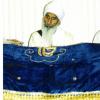-
Topics
-
Posts
-
I was searching igurbani.com which gives correct pronunciation of Gurbani. I can’t remember all of it at once. I guess it relies on more practice, like more Sehaj Paths. The meaning becomes clearer. I have noticed slight variants in it. This could be because it’s written in old Punjabi.
-
Veer Manpreet Singh, a lay preacher, claims that -Sikhs aren't supposed to worship Guru Granth Sahib ji. -We are only supposed to worship God as is written in Guru Granth Sahib ji. -We only "revere" Guru Granth Sahib ji. He says a lot of other things in this video, some are good refutations of Hindu superstitions, but the reformers often go too far. Anyways, what he is saying about not worshipping Guru Granth Sahib ji is totally wrong. The reason is Guru Granth Sahib ji is Guru. Guru is Satguru. Satguru is God. We worship God. Therefore, we also worship Satguru (Guru Granth Sahib ji). There are innumerable verses in Gurbani equating God and Guru. ਗੁਰੁ ਪਰਮੇਸਰੁ ਪਾਰਬ੍ਰਹਮੁ ਗੁਰੁ ਡੁਬਦਾ ਲਏ ਤਰਾਇ ॥੨॥ The Guru is the Supreme Lord and the Transcendent Master. The Guru floats (saves) the drowning one. p49 ਗੁਰੁ ਪਰਮੇਸਰੁ ਏਕੋ ਜਾਣੁ ॥ Know the Guru and God as One. p864 ਗੁਰ ਨਾਲਿ ਤੁਲਿ ਨ ਲਗਈ ਖੋਜਿ ਡਿਠਾ ਬ੍ਰਹਮੰਡੁ ॥ There is no one at par with the Guru. I have searched and seen the whole universe. p49 (If the Guru is the greatest in the whole universe, shouldn't we worship the Guru?) I'd like to ask Manpreet Singh what is worship? Any reasonable definition would include obeisance, remembrance, and praise. Those are exactly the same things Gurbani says to do regarding Guru! Remembrance and obeisance: ਸਤਿਗੁਰੁ ਅਪਨਾ ਸਦ ਸਦਾ ਸਮ੍ਹਾਰੇ ॥ Ever, ever, I think of the True Guru, ਗੁਰ ਕੇ ਚਰਨ ਕੇਸ ਸੰਗਿ ਝਾਰੇ ॥੧॥ and the Guru's feet I brush with my head's hair. p387 Praise: ਗੁਰੁ ਪਾਰਬ੍ਰਹਮੁ ਪਰਮੇਸਰੁ ਆਪਿ ॥ The Guru himself is the transcendent Lord and the supreme master. ਆਠ ਪਹਰ ਨਾਨਕ ਗੁਰ ਜਾਪਿ ॥੪॥੧੬॥੬੭॥ Throughout the eight watches of the day, O Nanak meditate thou on the Guru. p387 In fact, Gurbani says the way to find God is to worship (puja) of Guru: ਸਤਿਗੁਰੂ ਕੇ ਚਰਨ ਧੋਇ ਧੋਇ ਪੂਜਹੁ ਇਨ ਬਿਧਿ ਮੇਰਾ ਹਰਿ ਪ੍ਰਭੁ ਲਹੁ ਰੇ ॥ ਰਹਾਉ ॥ Washing and bathing the True Guru's feet, worship thou them. In this way thou shall obtain my Lord Master. Pause. p1118 Could it be any clearer that we are to worship Guru ji?
-
Bro, reciting a shorter Chaupai Sahib is hardly "anti-Dasam". It's fine to argue that the longer Chaupai is more traditional, but the short one isn't anti-Dasam. That's like claiming shorter Rehras is anti-Guru Granth Sahib ji just because there are fewer selections from Guru Granth Sahib. It might not be traditional, but it's not anti-Guru Granth Sahib. I prefer the longer versions, but let's not exaggerate. Every tradition has a slightly different Rehras version. Nanaksar vs Taksal vs Nihangs and so on. The basic template for Rehras is at the beginning of Guru Granth Sahib ji. Later, Chaupai Sahib was added and Anand Sahib always follows as the end of a process. Then some sangats added more saloks to start Rehras and others were added at the end. Some additional selections from Dasam Bani were also added, but it wasn't the same ones for every sangat. The important thing is to not hate on each other for these variations.
-
Umm, so you're upset that this jatha did Chaupai the same way it's being done at Harimandar Sahib for 100 years? Shouldn't you be upset at the manager of Darbar Sahib? I'm not saying that Sikhs who are aware of certain issues shouldn't do the longer Chaupai, but there are only so many battles you can fight. Instead of calling some jatha traitors because they're doing the (for better or worse) "standard" Chauapai published by the SGPC, it would be better to change things from the central point. You can't fault the average Sikh for picking up the average Gutka and doing paath.
-
It's the same here in Toronto. Alot of the gudwaras here are political orientated and get tons of funding from the government-probably want them stay hush hush with all the BS that has been happening with India. These guys are skewing gurbani. A complaint was sent to a ragi singh a couple of days ago in regards to a hukamnama.
-





Recommended Posts
Join the conversation
You can post now and register later. If you have an account, sign in now to post with your account.